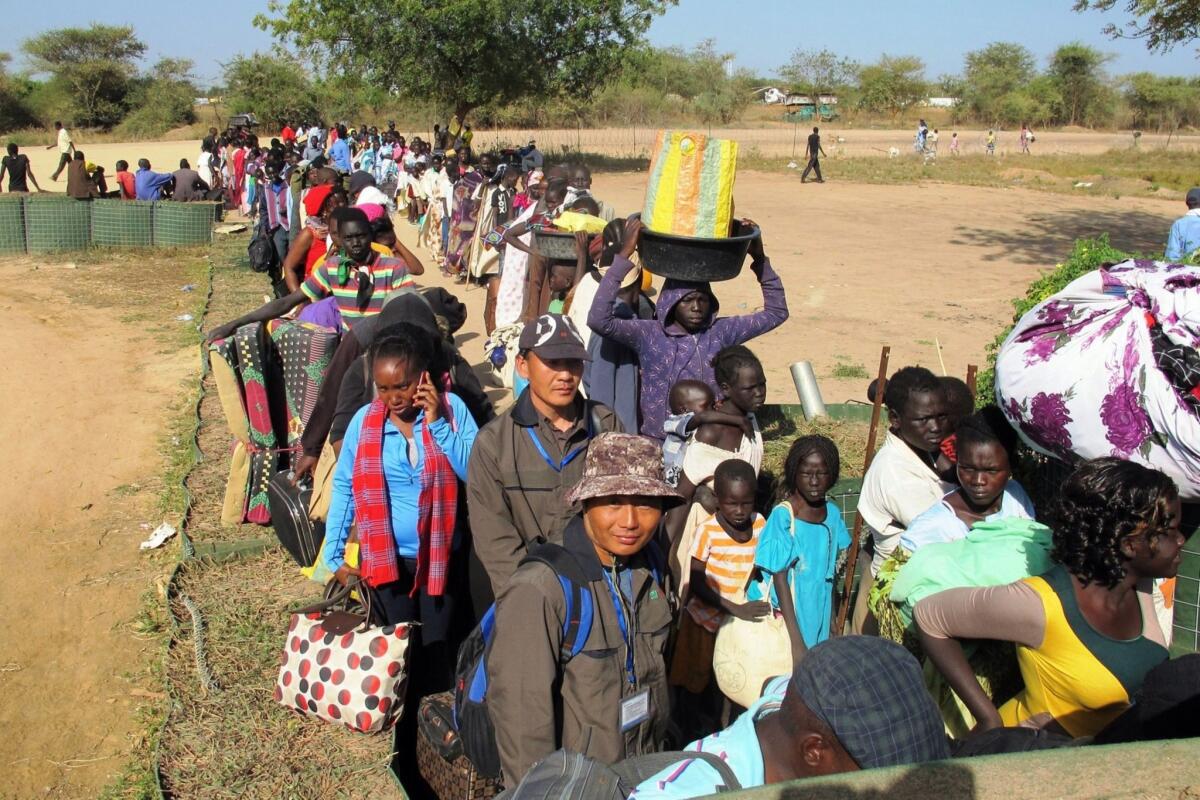Fears of civil war in South Sudan grow as army loses key town

- Share via
JOHANNESBURG, South Africa -- Fears of civil war in South Sudan grew Thursday, after South Sudan’s military admitted losing control of a key town in the country’s east to army mutineers.
The army lost Bor, the capital of Jonglei state, to a military faction associated with former Vice President Riek Machar, who has been accused by President Salva Kiir of launching a coup. Fighting continued in the region Thursday.
Machar denies any coup attempt, claiming that Kiir is inciting ethnic tensions.
[Updated at 10:18 a.m., Dec. 19: During an interview with Radio France Internationale on Thursday, however, he called for Kiir to be overthrown in a “palace revolution” by the military.
Human Rights Watch reported Thursday that scores of civilians had been killed in recent days based on their ethnicity.]The country appeared to be sliding dangerously toward civil war with a major faction in the army disloyal to the president, fighting outside the capital and heightened ethnic tensions. About 20,000 civilians have fled the violence for shelter in U.N. compounds.
U.N. officials have expressed alarm that the fighting between two military factions appears to be along ethnic lines, with soldiers from Kiir’s Dinka tribe on one side and others from Machar’s Nuer group on the opposing side.
“Our soldiers have lost control of Bor to the force of Riek Machar late on Wednesday. There was shooting last night. We don’t have information on casualties or the displaced in the town, as operations are ongoing,” army spokesman Philip Aguer told AFP Thursday.
Aguer said government officials in Bor may also have defected, since none were answering their phones, the Associated Press reported.
Bor was the scene of a 1991 massacre when ethnic Nuers killed hundreds of Dinkas. The force that defected from the army in Bor was under the command of Gen. Peter Gadet Yaak, a commander of Nuer ethnicity.
Jonglei state, the country’s most volatile region, has been the scene of ethnic tension between the Nuer and Murle tribes in recent years, with recurrent attacks and massacres of civilians.
Fighting began late Sunday between opposing factions in the presidential guard and spread rapidly in the capital Juba, as Kiir declared a coup had been quashed. Some 500 people, mainly soldiers, died in fighting that reduced some parts of Juba to rubble.
With intense pressure from international and African leaders, Kiir has expressed willingness to meet with Machar.
However government forces are searching for Machar and several others after arresting 11 people accused of involvement in the alleged coup.
The political situation in South Sudan has been extremely tense since Kiir sacked Machar as deputy president in July, along with his entire cabinet.
Since gaining independence from Sudan, South Sudanese relations with its northern neighbor have remained tense. At one point, South Sudan shut down oil production for 15 months over a disagreement over oil transit fees.
If fighting spills to oil-rich areas, the effects on oil production and South Sudanese revenue could be catastrophic to the young nation. South Sudan Information Minister Michael Makuei Leuth sought to calm fears about violence in oil-producing areas, mainly in the north of the country.
“There is no fighting in the oil fields. They are peaceful. The oil is flowing as usual,” he told Reuters.
U.N. Secretary-General Ban Ki-moon called Wednesday for political dialogue to end the crisis, warning the violence could spread.
“This is a political crisis and urgently needs to be dealt with through political dialogue.There is a risk of this violence spreading to other states [in South Sudan] as we have already seen some signs of this,” he told reporters.
President of the U.N. Security Council Gerard Araud likewise warned of a possible slide into civil war during an interview Wednesday.
“The two main ethnic groups, the Dinka and the Nuer, could go into a full-fledged civil war in the country,” he told the BBC.
The U.S. evacuated American citizens Wednesday and Britain was evacuating diplomatic staff and other citizens who wanted to leave.
South Sudan gained independence in a peaceful referendum in 2011, after a Sudanese civil war between north and south that lasted 25 years.
Twitter: @latimesdixonrobyn.dixon@latimes.com
More to Read
Sign up for Essential California
The most important California stories and recommendations in your inbox every morning.
You may occasionally receive promotional content from the Los Angeles Times.










